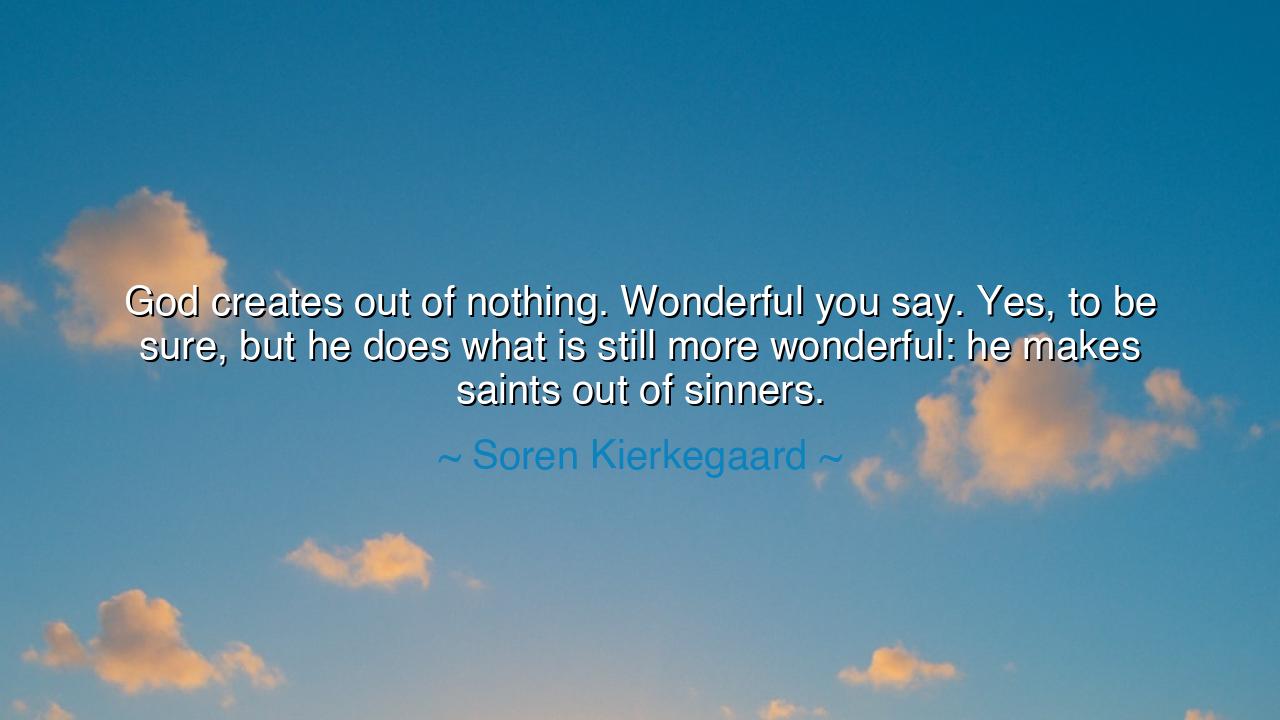
God creates out of nothing. Wonderful you say. Yes, to be sure
God creates out of nothing. Wonderful you say. Yes, to be sure, but he does what is still more wonderful: he makes saints out of sinners.






“God creates out of nothing. Wonderful, you say. Yes, to be sure. But He does what is still more wonderful: He makes saints out of sinners.” — so wrote Søren Kierkegaard, the Danish philosopher and theologian whose words cut through the cold intellect of the modern age to reveal the burning heart of divine grace. In this brief yet thunderous declaration, Kierkegaard unveils the most astonishing mystery of faith: that the greatest act of creation is not the birth of the cosmos, but the rebirth of the human soul. For to call forth the stars from the void is an act of omnipotence, but to draw holiness out of corruption — to make saints out of sinners — is an act of infinite mercy.
The origin of this quote is found in Kierkegaard’s writings on Christian existence — his meditations on faith, repentance, and the transformation of the soul by divine love. Living in the nineteenth century, in an age that worshiped reason and doubted redemption, he spoke like a prophet crying out in a desert of indifference. He saw how men marveled at God’s power to create matter and life, yet failed to tremble before His power to change hearts. In those days — as in ours — people looked to science to explain the world’s beginning, but ignored the miracle of moral renewal. Kierkegaard sought to awaken them, reminding humanity that the true wonder of God lies not merely in creation, but in re-creation — the turning of darkness into light, despair into faith, sin into sanctity.
To the ancient thinkers, creation from nothing — creatio ex nihilo — was the highest expression of divine might. Yet Kierkegaard dares to say that there is something greater still. Why? Because the creation of the universe required only God’s word, but the making of saints required His blood. It is one thing to bring order out of chaos; it is another to bring purity out of guilt. In this, Kierkegaard reveals the heart of Christian faith: that the God who shaped galaxies stoops down to touch the soul of the sinner, not to condemn, but to transform. Grace is thus the greatest act of creation — for it remakes the very essence of man, breathing into him a new life that no power on earth can destroy.
History offers countless witnesses to this miracle. Consider Augustine of Hippo, the restless seeker who once pursued pleasure and ambition above all else. His youth was marked by sin, his heart by vanity, his soul by longing. Yet when he encountered the living God, the sinner became a saint, the wanderer became a teacher, and his words — “Our hearts are restless until they rest in Thee” — became a hymn for all generations. In him, we see the truth of Kierkegaard’s words: that God not only forgives sin, but transfigures it into wisdom. From the ruins of human failure, He raises cathedrals of grace. Such transformations cannot be explained by psychology or philosophy; they are the fingerprints of divine mercy.
This teaching also humbles the proud. For if God can make saints out of sinners, then none may boast of his own virtue. Every saint bears the memory of his own fallenness, and every sinner carries within him the seed of holiness. Kierkegaard’s words remind us that redemption is not earned by merit, but received by faith. Just as creation was God’s gift to the universe, salvation is His gift to the soul. And so, when a man despairs of his own worth, when he feels unworthy of forgiveness, he must remember this — that God delights not in perfection, but in repentance. The power that once shaped the stars is now shaping the heart that dares to turn back to Him.
There is also courage in this truth, for it declares that no one is too lost to be found. In the history of humankind, the greatest heroes of faith were not born righteous; they were remade through struggle. Moses, who killed a man in anger, became the deliverer of his people. Peter, who denied his Lord in fear, became the rock of the Church. Mary Magdalene, once cast out and despised, became the first witness to resurrection. Each was proof that God’s mercy is stronger than man’s weakness. To make saints out of such souls is indeed the greater creation — for it shows not only God’s power, but His patience, His tenderness, and His boundless hope for humanity.
So, my child, take this lesson into your heart: you are not defined by what you have been, but by what God can make of you. The world may see your faults, but God sees your future. If He could speak light into the void, He can speak holiness into your heart. Do not despair over your failures, nor believe the lie that you are beyond redemption. Bring your brokenness to Him, and watch as He crafts from it something beautiful. For Kierkegaard’s truth remains eternal — God’s greatest miracle is not the stars that shine above, but the souls that shine within, redeemed and remade by His grace.
Therefore, live not in shame, but in gratitude. Strive not merely to be good, but to be transformed. Each day, let the divine artisan shape you anew, until even your weaknesses become instruments of His glory. For if God can make the universe from nothing, what will He not make from a heart that says, “Yes, Lord, here I am”? In that surrender lies the miracle Kierkegaard praised — the moment when creation begins again, and a sinner becomes a saint.






AAdministratorAdministrator
Welcome, honored guests. Please leave a comment, we will respond soon